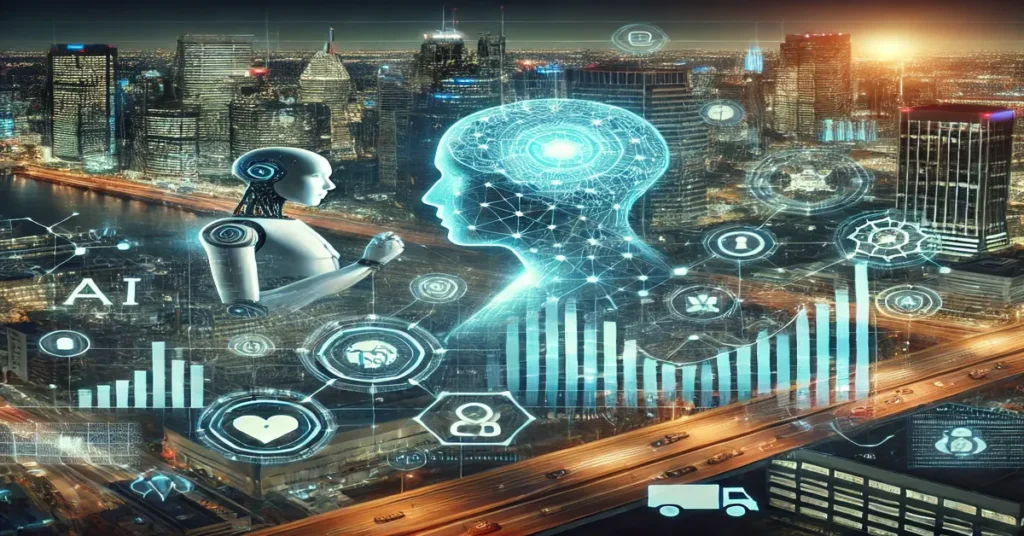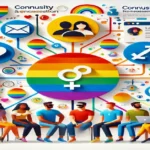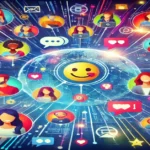Artificial Intelligence (AI) has transitioned from a futuristic concept in science fiction to a transformative technology reshaping industries, economies, and societies. This technological evolution is a testament to human ingenuity, merging advanced computing, data analysis, and machine learning to create systems capable of performing tasks that once required human intelligence. AI has become an integral part of our daily lives, from voice assistants like Siri and Alexa to complex applications in healthcare, finance, and autonomous vehicles. As AI continues to advance, its impact grows exponentially, presenting both opportunities and challenges for humanity xcxx.
This article explores the multifaceted aspects of AI, its historical development, its applications across various sectors, and its ethical, social, and economic implications. By understanding AI’s potential and challenges, we can harness its power responsibly to create a better future xcxx.
1. The Evolution of Artificial Intelligence
AI’s journey began in the mid-20th century, with pioneering efforts by researchers such as Alan Turing, John McCarthy, and Marvin Minsky. Turing’s seminal work, “Computing Machinery and Intelligence,” posed the question, “Can machines think?” This laid the foundation for AI as a field of study xcxx.
The 1950s and 60s saw the development of early AI programs like the Logic Theorist and the General Problem Solver, which demonstrated machines’ ability to solve logical and mathematical problems. However, limited computational power and data availability hindered progress xcxx.
The AI field experienced alternating periods of optimism and stagnation, known as AI winters. The 1980s and 90s brought renewed interest with the emergence of expert systems and machine learning. By the early 2000s, advancements in computing power, the internet, and data availability ignited an AI renaissance. Deep learning, a subset of machine learning inspired by neural networks, emerged as a game-changer, enabling breakthroughs in natural language processing, computer vision, and robotics xcxx.
2. Applications of AI Across Industries
2.1 Healthcare
AI has revolutionized healthcare through predictive analytics, medical imaging, and personalized medicine. Machine learning models analyze vast datasets to identify disease patterns, aiding early diagnosis and improving treatment outcomes. AI-driven tools like IBM Watson assist doctors in making informed decisions, while robots like Da Vinci streamline surgical procedures. Moreover, AI facilitates drug discovery by identifying potential compounds, reducing development time and costs.
2.2 Finance
The financial sector leverages AI for fraud detection, risk assessment, and algorithmic trading. Machine learning models analyze transactional data to identify suspicious activities, protecting consumers and institutions. AI-powered chatbots enhance customer service, while predictive analytics optimize investment strategies.
2.3 Education
AI enhances education by personalizing learning experiences. Intelligent tutoring systems adapt to individual student needs, offering tailored content and assessments. AI also automates administrative tasks like grading, freeing educators to focus on teaching. Additionally, language translation tools break barriers, enabling global collaboration.
2.4 Transportation
Autonomous vehicles epitomize AI’s transformative potential in transportation. Companies like Tesla and Waymo develop self-driving cars using machine learning, sensor fusion, and real-time decision-making. AI also optimizes traffic management systems, reducing congestion and emissions.
2.5 Entertainment
AI personalizes entertainment by recommending content on platforms like Netflix and Spotify. It also powers realistic animations, gaming experiences, and virtual influencers. Natural language processing enables chatbots like OpenAI’s GPT to create engaging narratives.
2.6 Retail
Retailers utilize AI to enhance customer experiences through personalized recommendations, inventory management, and dynamic pricing. Virtual try-on tools and chatbots improve online shopping, while AI-driven logistics streamline supply chains.
3. Ethical and Social Implications
The widespread adoption of AI raises ethical and social concerns that must be addressed to ensure equitable outcomes.
3.1 Bias and Fairness
AI systems can inadvertently perpetuate biases present in training data, leading to discriminatory outcomes. For example, biased algorithms in hiring or lending may disadvantage marginalized groups. Developers must prioritize fairness, transparency, and accountability in AI design.
3.2 Privacy and Surveillance
AI-driven data collection poses risks to individual privacy. Surveillance technologies, such as facial recognition, can be misused for authoritarian purposes, infringing on civil liberties. Striking a balance between security and privacy is critical.
3.3 Job Displacement
Automation threatens jobs in sectors like manufacturing, logistics, and customer service. While AI creates new opportunities, it necessitates upskilling and reskilling the workforce to mitigate unemployment and income inequality.
3.4 Ethical Decision-Making
AI’s role in autonomous systems, such as self-driving cars or military drones, raises questions about moral responsibility. Establishing ethical guidelines for AI decision-making is paramount.
4. Economic Impacts of AI
AI’s economic implications are profound, influencing productivity, innovation, and global competitiveness.
4.1 Productivity and Efficiency
AI automates repetitive tasks, enhancing efficiency across industries. This productivity boost drives economic growth and enables businesses to allocate resources to innovation and value-added activities.
4.2 Startups and Innovation
AI fosters entrepreneurship by lowering barriers to entry for tech startups. Companies leverage AI to develop innovative solutions, creating new markets and industries.
4.3 Global Competition
Countries vie for AI leadership, investing in research, talent, and infrastructure. Nations with robust AI ecosystems gain economic and geopolitical advantages, emphasizing the need for international cooperation to prevent technological divides.
5. Future Trends in AI
5.1 Generative AI
Generative AI models, such as OpenAI’s DALL-E and ChatGPT, create text, images, and videos, revolutionizing creative industries. These models enable applications in content creation, advertising, and design.
5.2 Quantum Computing
Quantum computing promises to accelerate AI advancements by solving complex problems beyond classical computing’s capabilities. This synergy could revolutionize fields like cryptography, material science, and optimization.
5.3 Human-AI Collaboration
Future AI systems will augment human capabilities rather than replace them. Collaborative AI tools will empower professionals in fields like medicine, engineering, and education, fostering a symbiotic relationship.
5.4 Ethical AI Development
As AI becomes more pervasive, ethical considerations will guide its development. Transparent algorithms, explainable AI, and robust governance frameworks will ensure responsible use.
Conclusion
Artificial Intelligence is a double-edged sword, offering immense potential for progress while posing significant challenges. Its impact on modern society is undeniable, transforming industries, economies, and daily life. As AI continues to evolve, it is essential to address ethical, social, and economic concerns to maximize its benefits and mitigate risks.
The future of AI lies in our collective ability to navigate these challenges responsibly. By fostering collaboration among governments, industries, and academia, we can create an AI-driven world that enhances human potential and upholds ethical principles.
FAQs
1. What is Artificial Intelligence (AI)?
Artificial Intelligence refers to the simulation of human intelligence in machines that can perform tasks requiring cognitive abilities, such as problem-solving, learning, and decision-making.
2. How is AI used in healthcare?
AI is used in healthcare for predictive analytics, disease diagnosis, medical imaging, personalized medicine, and surgical assistance. It also facilitates drug discovery and improves patient outcomes.
3. What are the ethical concerns associated with AI?
Ethical concerns include bias and fairness, privacy infringement, job displacement, and the moral implications of autonomous decision-making systems.
4. How does AI impact the job market?
AI automates repetitive tasks, leading to job displacement in some sectors. However, it creates new opportunities in AI development, data analysis, and emerging industries, emphasizing the need for workforce reskilling xcxx.
5. What are the future trends in AI?
Future trends include generative AI, quantum computing, human-AI collaboration, and the development of ethical AI frameworks to ensure responsible use xcxx.
6. How can we ensure responsible AI development?
Responsible AI development requires transparent algorithms, explainable AI, ethical guidelines, robust governance, and collaboration between governments, industries, and academia to address societal challenges effectively.







